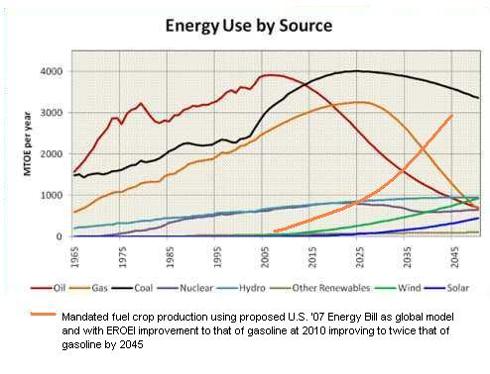Fuel crops don't seem to get much respect. Peak Oilers belittle their value in replacing oil, and even the main stream media is now griping about the corn, the high food costs, and low net energy. Ethanol can get no respect except, apparently, from the movers and shakers of world affairs. There is somebody out there who has tripled global ethanol production in just two years and is busy legislating a very aggressive growth model out to 2022 in the U.S. Energy Bill. What's up with this?
First, corn is just a starter feedstock. It is just the first thing the U.S. found laying around in the backyard just as sugarcane was in Brazil. It is coming to be regarded as a perfectly worthless solution to declining oil and is described by researchers as a "first generation feedstock" in the ethanol buildout. Lab work is sprouting all over the globe bringing the computerized gene mapping wizardry of today into focus on the designer fuel crop problem. Ethanol from cellulose (found in trees, grasses, etc.) has net energy of 5 or 6 and emits 85% less greenhouse gases than gasoline. Theoretically, biofuels are carbon neutral because plants absorb CO2 while they grow and put it back when combusted. One of the primary goals of designer biofuels is raising their EROEI to what we have enjoyed from fossil fuels, now down to around 8 as we go past peak.
What if ethanol's net energy were to be improved to that of oil soon and then improved to be twice as good as gasoline in say 35 years? And what if the U.S. Energy Bill were actually a feasible global model? You could project current transportation usage into the future and glimpse how ethanol is going to develope vs the other fuels: (click to enlarge)

These projections were done by Stoneleigh at The Oil Drum; I've added a projected fuel crop curve. This would start to put fuel crops on a par with coal and nat gas in global energy supply in a little over 20 years from now. This curve is an if-and-but scenario with everything going just right for fuel crops including solving the available land constraint problem and the net energy problem. But bioscience may do just that. Just how did they come up with the ethanol growth mandates in the Senate anyway? Maybe they just looked at a map like the one above and said, "This is what we need fuel crops to do."
Add to all this a dash of big time international political intrique into the fuel crop porridge, and you have an evolving drama worth watching. The big time international political intrique starts with a sleepy little company on the Arkansas/Mississippi border at One Cotton Row between Goat Island and Choctaw Bar Island. Here is where you have Delta and Pine Land, a seed company. But not just any seed. They have been quietly working with the USDA on Terminator seeds since 1983.
The U.S. government's interest in seeds centers on a view expressed by Henry Kissinger when he said, "Control the oil and you can control entire continents. Control food and you control people." He was known to have used food exports in what he dubbed "food as a weapon". In 1998, Delta and Pine patented the Terminator seed, a genetic modification that causes seeds to "commit suicide" after just the first harvest so farmers can't save and replant the seeds as they've done for thousands of years. They instead must buy a new supply of seed each season. Well, the global agribusiness cried foul and effectively blocked Monsanto, the world's largest seed developer, in their first attempt to buy out Delta and their patent in 1999. According to an article in Global Research (8/27/06) this global outcry "threatened the very future of the Rockefeller Foundation's Gene Revolution". They convinced Monsanto to shelve Terminator for a few years while they and other seed giants (Syngenta, Dow Chemical, etc.) proliferated their yield improving, gene modified fare, developing a very dependent global user base. So the sleepy little company from Goat Island now had the whole international geopolitical agri world by the seeds.
Delta and Pine Land had the financial backing of a Little Rock, Arkansas investment banking firm called the Stephens Group, which was their biggest shareholder. The Stephens Group prides itself on being the nation's biggest investment bank outside of Wall Street operating in the middle of hillbilly land and a prime mover and shaker in the rise of Tyson's, Wal-Mart, and Bill Clinton. Not that they dote on just one president mind you. The Stephans Group seems magically connected to all things shadowy and political. Jackson Stephens was a Navy Academy classmate of Jimmy Carter. During the Georgia bank scandals of Carter's years, Stephans stepped in to bail out Carter cabinet member Bert Lance's bank. And Stephans Group is nonpartisan in their help having done favors for George Bush and others. Their web of influence extends around the globe. Hillary Clinton was a partner in the Rose Law Firm, the house law firm of the Stephans Group. A couple years ago, Monsanto quietly bought Delta, which is now busy opening up subsidiaries all over the globe. Now the Terminator seed patent is ammo for food and/or fuel crop as a weapon and Hillary Clinton is our Secretary of State and Bill is being assigned geopolitical chores around the world.
The Global Research article states, "Under the Clinton presidency, agribusiness, especially agribusiness tied to the Stephans interests, made huge advances." With such high powered backing, I can envision a suprising development of fuel crops. The rapidly developing nations have small agrarian populations, a lot of land, and a strong motivation to make something very valuable for export. Enter the Gene Revolution for fuel crops.
Perhaps Cramer need not be so alarmed over Monsanto's reckless power grab. Maybe they can afford to be reckless.




No comments:
Post a Comment